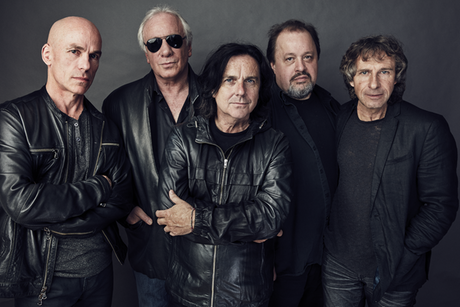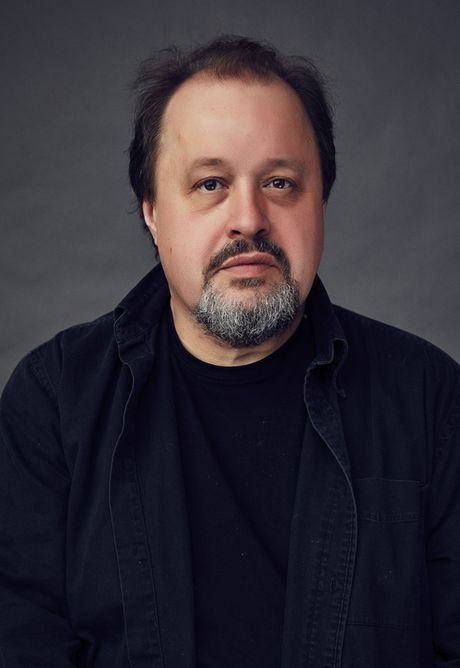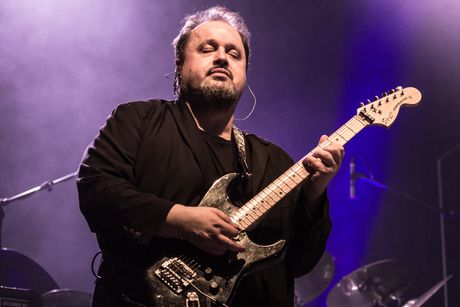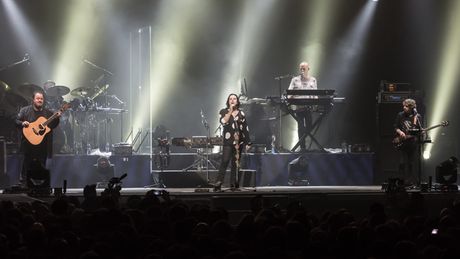
Marillion is a British rock band formed in 1979. Originally seen largely as Genesis clones, this influence became less noticeable with each of the band’s albums. They achieved large-scale European success with the release of Misplaced Childhood in 1985, which reached number one in the British charts, and charting highly in many other European countries as well. The band achieved lesser, but substantial, success in North and South America. The band’s charismatic lead singer Fish left after 1987’s Clutching At Straws – their fourth album.
The band continued with lead singer Steve Hogarth (now referred to as ‘h’), and the same lineup has continued performing together until the present time, releasing 14 further studio albums. Their most recent album, 2016’s FEAR (Fuck Everyone and Run), has charted higher than any of the band’s albums since Clutching at Straws. Their sound has developed continuously over the years, having little connection with their original albums from the Fish era, although they are still broadly considered progressive rock, or at the very least, to have progressive rock influences.
While their overall popularity declined in the 1990s, they’ve retained a solid fanbase through their innovative use of the internet, and have been credited with being early adopters, perhaps even creators, of the crowdfunding model of internet fundraising (see, for example, keyboardist Mark Kelly’s TEDx presentation), having used the internet to fund a US tour in 1997, and 2001’s Anorakphobia album, and most of their albums since then.
Marillion will be returning to Toronto on Hallowe’en (Monday, October 31st), performing at the Danforth Musical Hall.
Music Life Magazine’s Kevin Barrie spoke with Steven Rothery, guitarist and founding member of the band via Skype on October 4, 2016. Steve was calling from the United Kingdom.
KEVIN BARRIE: It’s Marillion’s second time back in North America in four years. The previous hiatus was roughly 15 years, minus the Los Trios Marillos tour [Interviewer’s note: this tour featured only three members of the band, performing a mostly acoustic setlist in smaller settings]. What is it that has allowed the band to return so quickly? Is it just easier having done it recently?

STEVE ROTHERY: Well, we’ve been touring the States for over 30 years on and off (and Canada). The last tour we did, which was just before the Sounds That Can’t Be Made album came out, was probably one of the most successful tours we’ve done [in North America] in that we didn’t lose a fortune. Traditionally we would always lose 50 – 60,000 dollars every time we toured over there and we made a conscious decision to increase the ticket price a little bit, which some of the local promoters complained about. But it did mean that we actually made a small profit for the first time. And a similar sort of situation with this [tour], you know – it’s maybe a slightly more expensive ticket but then again we bring in a lot bigger production with video screens. So visually, it’s going to be quite a lot richer experience than people have seen from us in the past.
KB: So, you’re bringing in a big show and people are paying similar prices to see other bands, so why not? So then, how would you summarize the band’s overall experience touring North America, compared to Britain’s in terms of fan base etc.?
SR: Obviously it’s just such a vast country both with touring the States and with Canada, so you tend to find that you have hotspots. Historically we do better in certain places. You know, New York, Washington, Philly’s always good for us – Boston, Chicago, Cleveland. Then in Canada, Toronto; Montreal and Quebec [are] especially strong for us. We’ve only played Vancouver once, many years ago, about 20-odd years ago. But, yeah – L.A., San Francisco are good. Colorado usually are pretty good. So there’s actually huge chunks of the States that we haven’t even visited. And the same with Canada – there’s probably only six or seven cities we’ve ever played in Canada.
KB: And I think that in Britain you were well-known for a period. Perhaps this turned out to be a negative thing in terms of your reputation in Britain – do you feel you have a cleaner slate touring in North America in some ways?
SR: Well I think, you know, we’re a band with such a history now – I mean, the new album’s our 18th studio album. We have a catalogue there so people know what to expect. So it’s not like we have anything to prove. In the past we’ve had the Marillion weekends in Montreal which have been very successful. I find the difference is with this album there’s such an incredible buzz, at least in Europe, about the new record – you know, the amount of five-star reviews we’ve had from major newspapers and magazines.
KB: It’s charted in Britain…
SR: Number four on the album charts, number one in the rock charts. We still don’t get that much radio support because radio is very much geared towards top forty – the same old stuff that you would expect pop radio to play.
KB: We’ll get back to the tour, but let’s talk about the new album. It was a long time in the making – it seems that there are some songs that were written a long time ago (i.e. 3-4 years) and yet there’s almost an aspect of premonition to them with recent events…
SR: Yeah…
KB: Maybe if you could comment on that a little. Some of them seem to be related to Britain, almost unintentionally, but I’m wondering if they could be related to events in North America as well. Or is this entirely unintentional?
SR: Well I think there’s themes on the album that seem very almost Nostradamus-like, especially considering some of these lyrics were written three or four years ago. Yeah, it sort of deals with the corruption of great wealth, you know, the attitude of wealthy individuals or corporations to exploit people or places or the planet for short-term personal gain. The banking crisis where all these rich bankers who were responsible for this financial meltdown waltzed off into the sunset with golden handshakes, and leave the rest of the world to pick up the pieces. It’s about, lyrically, about Steve’s [Hogarth, lyric writer] disillusionment with Britain – ever since the Iraq war – and how he doesn’t agree with how the humanitarian crisis – the immigrant crisis is being handled. There’s lots of things.
I mean the track The Leavers – which talks about the Leavers and the Remainers – has nothing to do with Brexit, although you would think it would. But it’s kind of about touring really – it’s about the people that have this lifestyle of constantly travelling and the effect that has on you and your loved ones. But yeah, it’s strangely relevant in today’s world really.

KB: What do you think about the new album in terms of it being a musical accomplishment? You are always developing and going into new areas…
SR: Well, I suppose it’s a musical stain [sic] in terms of there’s only five tracks on album, three of those tracks are quite long. The Leavers is 19 minutes, El Dorado and The New Kings are 15-16 minutes long. So, you know, it’s definitely not a pop album. We didn’t come up with a good radio track for it. It’s more of a sort of cinematic album really. When you’re dealing with big themes it’s great to have the freedom to take as long as you need to say what you want to say. It’s the difference between a novel and a short story really, that you can explore the different facets of the situation. Or you have those moments like in The New Kings where you have like a musical interlude really, which makes the lyrics even more poignant when they do kind of come back in. It’s very difficult to say – we just sort of do what we do and I think Mike Hunter and the producers really encourage a sort of certain aspect of what we do with this record and people are loving it.
KB: I’ve heard him [Mike Hunter] referred to as a sixth member of the band…
SR: Yes, I think that’s fair – I wouldn’t wish his job on anyone, you know – trying to get us to work in a certain way is like trying to herd cats. It’s a very frustrating and long process. But then again although it’s been four years since a studio album, we’ve been doing world tours – we played South America twice, we’ve done these Marillion weekends – so we’ve probably only spent nine months of those four years working on the new album, for the writing and recording – which isn’t a ridiculous amount, I think, to create something of this scope.
KB: Getting back again to touring – my understanding is that this isn’t a concept album, there’s no intent to play this thing from ‘front to back’, at least on the upcoming tour. And thinking of North America, are there any major plans setlist-wise, especially as you have been here recently?
SR: It’s not really a concept album. The two songs The New Kings and El Dorado have common threads that probably tie them together and those two songs we will be playing live, along – hopefully – with Living With Fear which we’ve been rehearsing for the last few days. But the rest of the set – we actually did a survey amongst our American fans about which songs they would like to hear us play. So, we’ve taken that on board and we’re playing quite a lot of those tracks.
KB: Without revealing any surprises, what’s the distribution of tracks from throughout the band’s career?
SR: It’s probably mainly the years since Steve joined, because obviously we’ve made 14 albums with Steve Hogarth and we only made four albums with Fish. And in the list of 100 songs that people wanted to hear, there weren’t really any Fish songs in the top 50, funnily enough.
KB: That’s a good thing in many ways….It’s a sign of what you’ve accomplished since Fish left, given that many people thought he was the band. It surprises me sometimes that you even go back to that time as it seems to me that it’s ancient history. I’ve read that sometimes the band, or at least ‘h’ [Steve Hogarth] wishes that they’d changed the name to something else after Fish left…
SR: Yeah, I think ‘h’ sometimes thought that, but I never thought that, because I wrote most of the music in the Fish years and I didn’t think….. To rename the band would have been a terrible gamble, and not one I felt that comfortable with really. I felt like [with] the musical side there was a consistency through the change, so why give up the name, really?
KB: One of the more unique things about Marillion is that they were crowdfunding on the internet before it was even known as crowdfunding, and you are still using this model on your recent albums. It sounds like it’s still continuing to be productive and successful for you…
SR: All the albums really, apart from one since the Anorakphobia album in 2000 I think, or 2001, we’ve crowdfunded, and I think our fans want us to take that approach. It means that they get the option of getting something very special and that they feel that they’re making a direction contribution. And at the end of the day we do it to give us the money to take the time we need to craft these songs. You know, we don’t kind of split the money and all go to the South of France for a month. We use the money to make the records. At the same time, there’s probably four major labels left in the world. We don’t make the sort of music that a major label would be interested in. And even if they were interested, we earn probably at least twice as much from crowdfunding as we would get as an advance from a major label.
KB: I’ve been hearing that there might have been some challenges and kinks recently – it must be very frustrating – but those have been worked out?
SR: We used a company called PledgeMusic, which are the top UK music crowdfunding company, just really, to take care of the fulfillment because that’s where in the past we’ve had nightmares with the company that you give fulfillment to and the shipping companies that they use. We thought by going with Pledge we would avoid all those problems, but apparently not. So that has been the main frustration, I think, with this album – which is why, no doubt, we’ll look at the situation very carefully before we follow the same path again.
KB: What are the future plans of the band in general? Is it a band that’s planning ahead or is it taking things as they come these days?
SR: We’re touring – we start the tour in just several weeks time in San Francisco. And we’re touring pretty much till Christmas, and then I have some solo shows in January with my solo band. And then we start rehearsing for the Marillion weekends. And we have four of those this year – three-day concerts where we play three different sets each night. We have one in the Netherlands, one in Poland for the first time, one in the UK, and one in Santiago, Chile, for the first time. And that kind of takes us through till June. I think there’s talk of some more concerts in Europe, sort of July/August, and some festivals. We’ll be working pretty much till sometime in October, in Marillion. Then maybe we’ll have a short break and then start writing the next album.
Connect with Marillion online: Website Facebook Twitter YouTube Instagram

